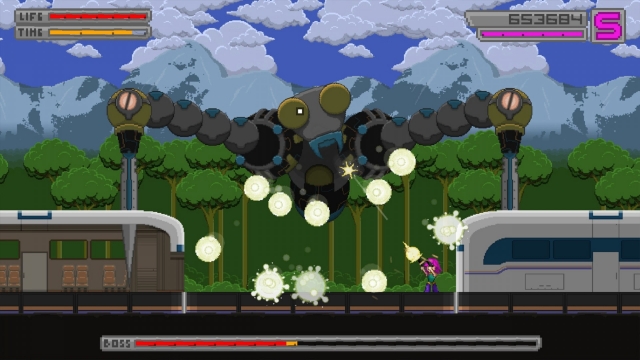
You Need to Play Bleed
Developed for the PC a few years ago, Bleed is a game that more or less flew under the radar for me, as I’m sure it has for many others. I wasn’t sure what to expect going into it, other than that it was cheap, and I probably wouldn’t get all that much out of it: I was wrong, and now I’m here to tell you why you need to go and play Bleed right now.
Bleed sees the player takes control of Wryn, a self-aware super-powered girl that has aspirations to become the greatest videogame hero of all time. She and the player must traverse vastly different environments and combat all kinds of cannon fodder for the chance to fight and kill the other six best heroes in the world. The story isn’t exactly this one’s strong suit, but it definitely made me laugh in the way it contradicts itself and paints Wryn not as an anti-hero, but as a genuinely innocent (yet highly skilled) dreamer. Her interactions with the player are also a nice touch. Being told that “even a broken clock is right twice a day” upon failure really helped to characterise Wryn as a likeable and ambitious person, while simultaneously motivating me to keep playing.

The thing that keeps me coming back to Bleed is, without a doubt, the gameplay. Wryn starts off with dual wielding pistols and packing a rocket launcher, which can perhaps give you a scope of the difficulty that this game eventually starts to throw at you. On top of that, she can perform several lightning fast dashes after her initial jump and even slow down time, giving her unparalleled ability when it comes down to mid-air combat. I’ll admit I wasn’t completely sold to begin with; me attempting to use a mouse and keyboard resulted in many, many, many unfair deaths because I wasn’t able to accurately navigate the environments. Once I plugged in my gamepad, however, Bleed turned into an awesome twin stick shooter that offered an incredible amount of freedom in movement. Wryn’s time-slow ability allowed me to dance around speeding bullets before planting several of my own, and by the time I was at the final boss, I felt as though I could accomplish anything.
Bleed goes to great lengths to ensure that the player always has new challenges to overcome and new play styles to try. Each difficulty setting supplies extra enemies and extra environmental hazards without obviously increasing enemy health, making each play through feel just that little bit more special. On top of that, the player is able to purchase all new weapons, from a demanding but potent laser rifle to a katana that beats back bullets. Admittedly, I’ve spent most of my time using the forementioned pistols, but the fact that I’m still able to tear through bosses using them just shows how much freedom this game provides. Bleed also gifts the player with three other characters to play as, each with their own unique abilities and handicaps. At one point, I found myself wondering why I wasn’t rewarded for evading a bullet that came a little too close, only to unlock a character that uses that mechanic to charge the time slowing ability. In this way, the game offers a tremendous amount of replayability despite being one of the shorter games in my library. Now that I think about it, Bleed would be very much at home sitting inside an arcade, with its high score system, charming yet simplistic art style and its electronic soundtrack, which I have ended up loving more than sense would dictate. Everything about this game screams retro without shoving that fact down the player’s throat, and I can very much respect that.

One of the few issues I have with this game is the way it deals with checkpoints. Every level is broken up into several sections with a transition between each of them. This transition acts as the players starting point, and although welcome when it came to those silly mistakes, it felt as though this system undermined the natural difficulty of the game. With no real punishment for death beyond a lower score, I found myself tanking my way through the later levels on ‘very difficult’. Bleed naturally feels as though it should take a certain degree of finesse on the part of the player, and allowing them to throw themselves against obstacles until they eventually make their way through takes away that requirement of the player.
Ultimately, Bleed is fun to play, challenging and phenomenally satisfying. It demands high skill, but a relatively low investment, meaning that I can come back to it several months later and keep playing in the same way that I was before. It attracts through its simplicity, and captivates through its surprising depth; this is one of the games I would recommend regardless of someone’s personal gaming preference.






COMMENTS